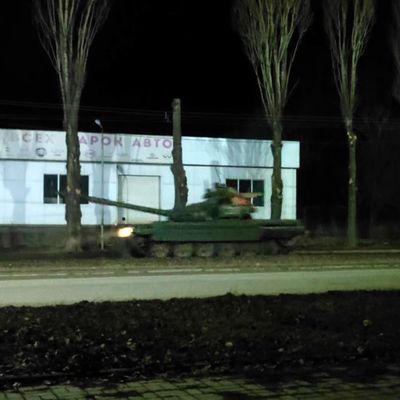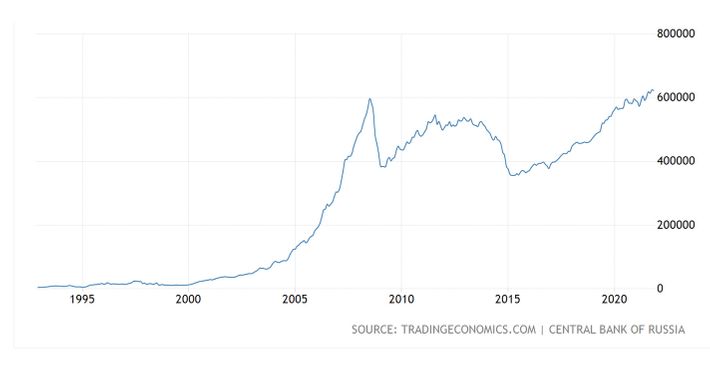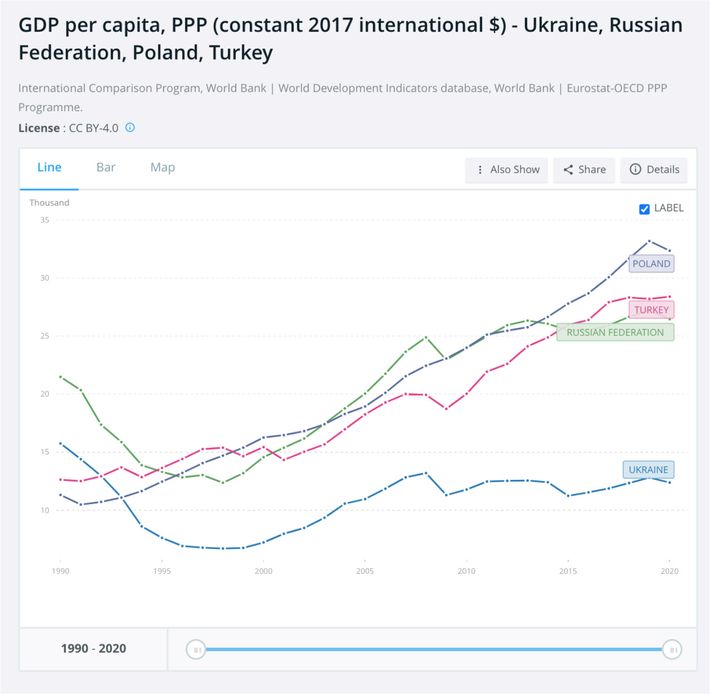
This week, Russian president Vladimir Putin officially recognized two separatist-controlled regions in Eastern Ukraine — Donetsk and Luhansk — as independent states, in defiance of international law, and ordered Russian forces to enter those regions to conduct a “peacekeeping” mission. He also declared that Ukraine was not really a separate country so much as a part of Russia that the Communists had foolishly separated into a nationalist sub-territory. After observing that contemporary Ukranians have “overturned monuments to Lenin” and “call it de-communization,” Putin said, sounding not at all like a Hollywood villain, “You want de-communization? Very well, this suits us just fine. But why stop halfway? We are ready to show what real de-communizations would mean for Ukraine.”
All this has led Ukranians and their western allies to fear that Russia might soon launch a full-scale invasion of the country. And it has also sent many American dilettantes — who know very little about events beyond their nation’s shores, but would like to feign otherwise at dinner parties — scrambling desperately to form an opinion on the subject that is consistent with the facts and/or their personal brands.
To make their task easier, Intelligencer has prepared a diverse menu of potential takes, fit for a wide variety of pseudo-intellectuals.
1) “Biden’s response to Putin’s aggression was perfectly calibrated.”
In retaliation for Putin formally denying Ukraine’s sovereignty over Lugansk and Donetsk, the Biden administration sanctioned two Russian banks and three Kremlin-linked oligarchs, while freezing all western purchases of Russian sovereign debt (an attempt to choke off Moscow’s access to foreign financing).
These were half measures by design. The White House’s aim was to punish Putin’s affront to international law while keeping its heaviest (figurative, economic) artillery in reserve. For the moment, Russian troops have not entered into any Ukrainian territory where they did not previously boast a presence. For this reason, the White House was initially reluctant to even describe the deployment of Russian “peacekeepers” to the Donbas region as an “invasion” of Ukraine. Although it has since embraced the I-word, the White House believes there is still time and opportunity to avert the nightmare scenario of another blood-soaked war of conquest on the European continent. Hitting Russia with the full spectrum of potential economic sanctions would risk persuading Putin that he has nothing to lose from further aggression. Therefore, Biden characterized Tuesday’s sanctions as only the “first tranche,” and vowed that Russia “will pay an even steeper price if it continues its aggression, including additional sanctions.”
So, one potential take on the current crisis is that Biden has calibrated the U.S. response just right, maximizing the world’s prospects for peace. This is a sound take for anyone whose Subaru has multiple bumper stickers featuring Joe Biden’s name.
2) “Biden’s response to Putin’s aggression didn’t go far enough.”
This take is a great fit for garden-variety Republican officeholders and Democrats with a passion for saber-rattling. The standard version holds that Biden should’ve hit Russia with all of the West’s economic might. As Alabama senator Tommy Tuberville put it, “The incremental sanctions issued by President Biden are a weak response. The time to have imposed harsh sanctions was yesterday.” New Jersey Democrat Bob Menendez similarly suggested this week that Putin’s actions merited “crushing sanctions.”
One virtue of “Biden’s not doing enough to stop this” is that the take is highly customizable. It merges seamlessly with all manner of preexisting policy hobbyhorses. For example, Missouri Republican Josh Hawley is a longtime critic of the president’s climate policies. Thus, the senator melded a critique of Biden’s supposedly effete response to Russian aggression with a demand for new fossil-fuel pipelines. Which is a solid play for conservatives who plan to simultaneously blame Biden for Russian gains in Ukraine and higher gas prices in the United States: If the president’s climate hysteria hadn’t prevented America from achieving energy independence, the U.S. could starve Russia’s economy and have $1.99 gasoline, too!
Tuberville, meanwhile, managed to pair his criticism of Biden’s insufficiently hawkish response to Putin’s actions with a sop to rightwing isolationist sentiment, saying that, in light of the president’s weakness, “it is time for Europe to contribute more to its own security.”
3) “Biden’s response to Putin’s aggression went too far.”
A contrarian view in the American context, this take comes in “anti-war realist” and “far left yet objectively pro–imperial oligarchy” versions.
Although the White House went relatively light in its first round of sanctions, it did cancel a previously scheduled meeting between Secretary of State Anthony Blinken and Russian Foreign Minister Sergey Lavrov. In the view of some anti-war realists, like the Quincy Institute’s Anatol Lieven, that doesn’t make much sense. The Biden administration still seeks a diplomatic resolution to the conflict, after all. So why forfeit an opportunity for high-level diplomatic negotiations, when Russia has yet to send troops into areas of Ukraine that weren’t already under separatist control?
Some far-left critics of American empire, meanwhile, take the indictment of Biden’s alleged belligerence a bit farther. In their account, the 2014 Ukrainian Revolution — which pushed Ukraine’s Putin-aligned president Viktor Yanukovych out of power — was in reality an American coup against a democratic government that dared to scorn the West’s embrace. Therefore, the U.S. bears primarily responsibility for the resulting civil war in eastern Ukraine between Russian-backed separatists and the U.S.-backed Ukrainian army. From this perspective, whatever their geopolitical aims, Putin’s incursions into Crimea and Donbas were also legitimate efforts to protect Ukraine’s Russian speakers against potential oppression at the hands of Ukrainian nationalists.
Adopting this perspective on the conflict has some benefits. It will allow you to trigger bourgeois libs by reciting some genuine facts that complicate the official narrative of current events. Among those facts: It was once conventional wisdom among America’s foreign-policy Establishment that NATO expansion into eastern Europe was a senseless violation of Russia’s legitimate security interests; President Yanukovych chose to align with Moscow over Europe in 2013 in part because the EU tried impose some austere financial terms; Ukrainian nationalists played a leading role in derailing the peace process between Russia and Ukraine over the past two years; and the U.S. government’s professed horror at illegal annexations rings hollow given its recognition of Israel’s sovereignty over the Golan Heights.
On the other hand, this take also requires you to pretend that young, urban Ukranians rose up against their government in 2014 solely because their western puppet masters manipulated them into doing so — not because they lived under a heinously corrupt government, had seen nearby countries enjoy vast increases in living standards after aligning with Europe, and harbored much the same desire for democracy and collective prosperity that animates their western counterparts. Further, embracing this worldview will require ignoring the plain fact that Putin is the chief aggressor in the present conflict, that he has rationalized his military incursion into the Donbas on explicitly imperial grounds, and that the Ukrainian government, for all its flaws, is more democratic than the Russian one that aims to nullify its sovereignty.
So, this one’s for select audiences.
4) “No Russian autocrat ever called me racist.”
This is an excellent choice for cable-news hosts with a taste for paleoconservative populism and/or securing hate-shares from liberals on social media. The short version of the argument is: From the American perspective, Vladimir Putin poses a far smaller threat to democracy than both false allegations of racism against Tucker Carlson and dirty immigrants.
The more elaborate version of the take, as articulated by Carlson and other contrarian conservatives, is that America has no interest in aiding Ukraine or “democracy.” What we do have an interest in is containing China and keeping energy cheap. And Putin’s Russia — a rightwing, nationalist, Christian state that has resisted the poisonous gender ideology of the decadent West — is uniquely well positioned to aid the U.S. in its quest to keep Beijing down and carbon emissions up.
5) “This never would have happened if Trump were president.”
Like No. 2, this one’s primarily for normal Republicans like National Review editor-in-chief Rich Lowry or shouting baseball Dan McLaughlin.
If you find the conservative version of this take implausible — given that President Trump wasn’t known for his staunch anti-Putinism — there is also an anti-Trump variation: As Damon Linker argues, Putin’s “relative restraint during the Trump presidency was a function of a reasonable expectation he might get everything he wanted without having to fire a shot.”
6) “This never would have happened if Trump were president. Also, Putin’s invasion of Ukraine is a work of genius.”
As far as I can tell, this take appeals exclusively to former U.S. presidents who had cameos in Home Alone 2.
7) “Biden should forswear NATO’s enlargement into Ukraine to keep the peace.”
Progressive realists will want to pair this with No. 3. The basic idea here is simple: Biden has unequivocally ruled out sending U.S. ground troops to defend Ukraine. Indeed, the president has even declared the deployment of U.S. forces into Ukraine — for the sole purpose of evacuating U.S. citizens from that country — beyond the pale, since bringing U.S. and Russian troops into close contact would risk triggering “a world war.”
A plain implication of this stance is that the U.S. is not willing to guarantee Ukraine’s defense, something it would have to do if Ukraine joined NATO. So, in practice, the U.S. does not want to expand NATO into Ukraine. But it has refused to formally forswear NATO expansion into Ukraine, even as Putin has demanded such assurances as one condition of peace. If the U.S. wishes to minimize the risk of a bloody war, why not make its scant interest in NATO expansion explicit?
8) “Appeasing Putin on NATO expansion won’t work because his true aim is to rebuild the Russian empire.”
The dominant perspective among liberal Russia hawks, this view holds that Putin is less worried about Ukraine becoming a NATO member than about the country becoming a well-functioning democracy. Former U.S. ambassador to Russia Michael McFaul and internal-relations scholar Robert Person offer a paradigmatic rendition of the case. In a nutshell, they argue that there is no real prospect of NATO welcoming Ukraine into its alliance and that Putin is likely aware of this. What he fears is that a democratic Ukraine with economic ties to the West might flourish and thereby undermine domestic support for his own authoritarian regime.
Thus, what Putin really wants is imperial domination of his nation’s region, with puppet regimes operating at his behest throughout Russia’s sphere of influence. This perspective will strike some as a bit ideologically self-flattering for western defense intellectuals. But Putin’s own speechwriters did kind of endorse the take on Tuesday.
9) “The economic dimensions of this conflict are underappreciated.”
For those who are more interested in sounding smart than aligning with a particular ideological faction, this is a smart play. To deploy this take, all you really need to do is screenshot some charts from Adam Tooze’s newsletter, and tweet them out beneath the word “Fascinating.” If you’re aiming for a higher level of sophistication, however, you’ll want to spell out what the charts actually show. For example, here we see an underappreciated precondition of Russia’s geopolitical brazenness: The Kremlin has built up one of the largest foreign currency reserves in the world, which it can use to dilute the impact of economic sanctions for some time to come.
Alternatively, here is crucial context for both Ukraine’s domestic instability and younger Ukranians’ eagerness to follow Poland into NATO and the EU: Since 1990, Poland, Turkey, and Russia have all enjoyed large increases in GDP per capita, while the Ukranian economy has actually shrunk.
10) “Whatever, just don’t let gas prices go up.”
Finally, if you just want to emulate the worldview of the median U.S. voter, you can express a weakly held preference for strong sanctions against Putin’s regime and an irrational belief that Joe Biden will be responsible if the Russia-Ukraine conflict leads to higher U.S. gas prices. Go ahead and judge the president’s job performance exclusively on how much it costs you to fill up your car on any given day, as is your right as a democratic citizen in God’s USA.
































